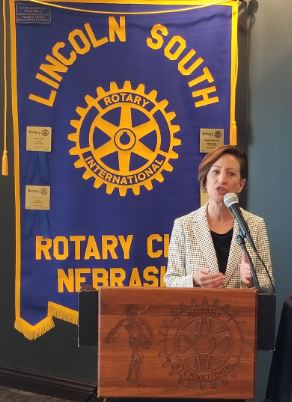On May 31, we got an update on the Early Education aspect of Prosper Lincoln from Michelle Suarez.
More than 2,100 ideas were used in crafting a shared agenda for the future of Lincoln focused on Early Childhood, Employment Skills and Innovation & Entrepreneurship, This is how Prosper Lincoln got started.
Our speaker at Lincoln South Rotary Club on May 31 was Michelle Suarez, Proper Lincoln’s Early Childhood Developer. This position is a great fit for Michelle. She has spent her career serving our most vulnerable children and families.
Michelle referred us to Lincoln Vital Signs which is intended to inform conversations, spark connections and spur action. The first report was published in 2014 led to the creation of Prosper Lincoln. Subsequent reports show changes and progress. She shared many facts and figures many of which were found at www.prosperlincoln.org.
In the report we see that education is clearly linked to income, and the neighborhood where one lives can create barriers to economic success. There are concerning disparities including:
• Number of persons working full-time while in poverty has doubled
• More than 15% of Lincoln residents live in poverty
• Persons from racial and ethnic minority groups have higher rates of poverty and unemployment
• Nearly half of Lincoln Public School students participate in free and reduced lunch programs
• Lincoln Public School students in poverty and from racial and ethnic minority groups have lower educational achievement
• Across Lincoln neighborhoods, there is as much as a 20-year gap in life expectancy
Statistics show that early childhood education is important to get individuals started on an education quest.
• While formulating the Strategic Plan for Prosper Lincoln, these facts were listed:
• Nationally, more than half the achievement gap in later years is present at kindergarten entry.
• Children who begin school behind tend to stay behind and are at risk for dropping out of school, criminal behavior, unemployment
• 34 states and District of Columbia have mandated readiness assessments, Nebraska does not
• For all child care providers, Nebraska and Iowa have among the lowest state standards for child care licensing
Challenges that were listed in creating the initial strategic plan in the area of Early Childhood Development:
• Approximately 65% of at-risk children aged 3-5 are not enrolled in high quality preschool programs
• Program capacity of high quality preschool programs is insufficient to meet demand
• Many of the high-quality preschool programs have waiting lists.
• Lincoln has a much higher percentage of families with al parents in the workforce than the national average.
• In 2013, the annual cost of care in a child care center for any child younger than school-age was more than resident tuition and fees at the University of Nebraska-Lincoln.
• A significant educational achievement and attainment gaps exists among different subpopulations and communities
• The percent of children in poverty increased 78% since 208; 12,100 children in Lincoln live in poverty.
• Nearly 30% of all families with more than two children have incomes below the poverty threshold; female headed households with more than two children, 60% are below the poverty threshold.
• Approximately 43% of Lincoln Public Schools’ students participate in Free or Reduced Price Lunch
Statistics of Nebraska respondents:
• 22% of families cited low or poor quality as one of the biggest challenges to getting high-quality early childhood care and education
• 46% of respondents were satisfied or very satisfied with the quality of early childhood care and education
• 82% of residents rated the importance of early childhood care and education to a child’s success in life as very important
• 57% of families cited expense as one of the biggest challenges to getting high-quality early childhood care
From the Prosper Lincoln Early Childhood Development webpage: Creating equal opportunities for all children – regardless of race, gender and socioeconomic background – to learn and grow in their early years is vital to Lincoln’s prosperity.
The goal is to nurture every child on the path to success.
By the year 2020 Prosper Lincoln will:
1. Increase cross-sector initiatives to advocate for and improve early childhood development.
2. Increase community awareness about what quality early childhood development is and looks like.
3. Increase resources to enrich early child development at home, in care settings and in the community.
1. Increase cross-sector initiatives to advocate for and improve early childhood development.
2. Increase community awareness about what quality early childhood development is and looks like.
3. Increase resources to enrich early child development at home, in care settings and in the community.
